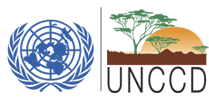The latest issue of 'UNCCD News,' which is published by the UN Convention to Combat Desertification (UNCCD), focuses on the topic of dryland tourism.
In his introductory note, Luc Gnacadja, UNCCD Executive Secretary, highlights that, "if tourism is to play a role in controlling desertification and protecting the drylands' unique biodiversity and their natural and cultural heritage, it must be sustainable along the value chain."
 September 2013: The latest issue of ‘UNCCD News,’ which is published by the UN Convention to Combat Desertification (UNCCD), focuses on the topic of dryland tourism. In his introductory note, Luc Gnacadja, UNCCD Executive Secretary, highlights that, “if tourism is to play a role in controlling desertification and protecting the drylands’ unique biodiversity and their natural and cultural heritage, it must be sustainable along the value chain.” Gnacadja notes that Namibia, which is hosting the eleventh session of the Conference of the Parties (COP 11) to the UNCCD from 16-27 September 2013, is one of the world’s most popular dryland destinations.
September 2013: The latest issue of ‘UNCCD News,’ which is published by the UN Convention to Combat Desertification (UNCCD), focuses on the topic of dryland tourism. In his introductory note, Luc Gnacadja, UNCCD Executive Secretary, highlights that, “if tourism is to play a role in controlling desertification and protecting the drylands’ unique biodiversity and their natural and cultural heritage, it must be sustainable along the value chain.” Gnacadja notes that Namibia, which is hosting the eleventh session of the Conference of the Parties (COP 11) to the UNCCD from 16-27 September 2013, is one of the world’s most popular dryland destinations.
The newsletter notes that, while tourism can offer significant economic opportunities, it can compete with other livelihoods over access to natural resources. It highlights that it is “the tourism-related threats to land, the environment and ecosystems which give greatest cause for concern in the context of the UNCCD, because land is the asset that meets these needs.” The article explores a number of elements and examples related to sustainable tourism, such as production of organic products, agro-tourism, and conservation fees, and emphasizes that, if tourism is to play a role in addressing desertification, “it must be sustainable all along the value chain.”
This issue of UNCCD News also includes an article from Edward Norton, actor, environmental activist and board member of the Maasai Wilderness Conservation Trust. Norton highlights that, “The Economics of Ecosystems and Biodiversity (TEEB) makes a very persuasive case that things that we have accounted as GDP growth or profit represent impoverishment or loss” and says this is an “incredibly important way of approaching the question of environmental preservation and sustainability because it helps us move away from the 20th century strategy of arguing for the intrinsic value of nature, and into what I think is going to be the strategy for the 21st century, which is the argument that people cannot thrive if we don’t account for the underlying economics of ecosystem services.” [Publication: UNCCD News Issue 5.3]